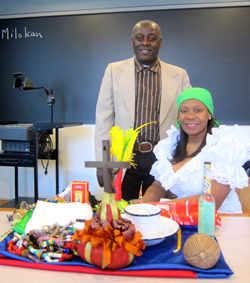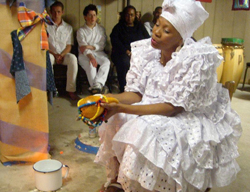
| Vol.
XXX No.
2 November / December 2017 |
| contents |
| Printable Version |
"Voodoo Science" at MIT?
Lunchtime on Wednesday, October 25, 2017, started with a typical scene at MIT's Faculty Lunchroom at the Ray and Maria Stata Center. At one large round table nearby: A group of students sitting with one faculty member explaining some difficult scientific concept and related innovations in technology. But one word kept coming up and drawing my attention: “. . . Voodoo. . . Voodoo. . . .” So I listened more closely, and heard things like: “This is a beautiful proof, but there's some Voodoo in that equation that no one can figure out. . . .” then “This machine worked, then some Voodoo happened, and it broke. . . .” At that point, I began wondering if I should consider my MIT colleague’s use of the word “Voodoo” as a micro aggression against Black lives, Black cultures, etc.? Or, perhaps, this was simply another banal instance of the English language borrowing words from other languages, in this case from my native Haitian Creole – just like English has borrowed words such as “salsa” from Spanish and “voila” from French and “eureka” from Greek?
As I processed these thoughts I felt knots in my throat and stomach, and I could no longer swallow my food. I was reminded that I have long tried, with relatively little success to date, to have some MIT colleagues and students question the use of the word “Voo Doo” in the title of MIT’s humor magazine. This title was chosen some 100 years ago, clearly as a racist insult against Blacks in my native Haiti and in the U.S. Indeed, the inaugural issue of MIT’s only “humorous” magazine reads:
“The very name under which the Being makes its appearance, is clothed in mystery, for Voo Doo is that name given to certain magical practises, superstitions and secret rites prevalent among the Negroes of the West Indies, and more particularly in the Republic of Haiti. We need not, however, travel so far to find references to the Voo Doo. In our own southern states, before the Civil war, voodooing was generally practised among the slaves, and voodoo doctors were common.
While the great mass of their professed art was a rank imposture, still they possessed enough of devilish skill to make them wholesome objects of dread. Their incantations and spell workings were always conducted in secret, no one being allowed to witness the more occult and potent portion of their ritual.”
(From: http://web.mit.edu/voodoo/www/archive/pdfs/1919-Mar.pdf.)
Historians such as Laurent Dubois, in his book Haiti: The aftershocks of history, have documented one reason why “Voo Doo” practitioners became “wholesome objects of dread.” One reason is because their religion (yes, Voodoo, or more accurately, Vodou in Haiti), alongside the Haitian Creole (“Kreyòl”) language, was a source of solidarity among the enslaved Africans who rebelled and affirmed their humanity against their oppressors. Vodou and Kreyòl helped these Africans, from various ethnic and linguistic groups, unite their forces and military know-how in order to launch and win the only successful revolution, in world history, by formerly enslaved captives.
 Manbo Maude Evans and Master Drummer Jean Marseille during their visit to my MIT
Manbo Maude Evans and Master Drummer Jean Marseille during their visit to my MITBlack Matters class, on March 23, 2017.
(click on image to enlarge)
This revolution started at the end of the eighteenth century when it was unthinkable, among Europeans, that Black lives could ever matter. At the end of that epic revolution, the Haitians won their freedom after fighting against some of the most powerful European armies – from France, Spain, and England. In so doing, the Haitians proved that Black lives did matter, and that Blacks too entertained profoundly enlightened ideals of universal human freedom and dignity – ideas at odds with the colonial world order whereby everything African (i.e., the Africans’ intellect, culture, language, religion, etc.) was deemed inferior vis-à-vis the ideals of the European “enlightenment.”
As it turns out, it was the Africans who ended up teaching the European enslavers in colonial Haiti and their sponsors and philosophers in Paris what “liberté, égalité, fraternité” really meant. Indeed, though the French revolution had “liberty, equality, fraternity” as slogan, these concepts were not taken to hold universally, especially when they risked undermining France’s profits from Haiti, which, then, was the most profitable colony on earth, from the labor of the African captives!
Therefore, the enslaved Africans and their Creole descendants in Haiti were not, and could not be, considered free, equal, and siblings to the French. Yet it is these very Haitians who, as they abolished slavery and created the first Black republic in modern times, gave “liberty” and “equality” and “fraternity” their true universal meaning. Haiti’s 1804 Declaration of Independence, with its desiderata of freedom and equal opportunity for all, went squarely against the wishes and the profit motives of France and other pro-slavery powers in Europe and the Americas, including the U.S., where “pursuit of happiness” excluded the Blacks whose personhood was legally reduced to “three-fifths” of that of the Whites. So Haiti had to be embargoed and punished, and punished it was, in many ways, including an indemnity paid to France for “lost property” – such as the monetary value of the very human beings whom they had enslaved and who fought and won to liberate themselves! This indemnity amounted to what is now worth tens of billions of dollars.
| Back to top |
Returning to the present and to that MIT Faculty Lunchroom in October 2017: I approached the dining table of my unwittingly Vodou-bashing colleague, and I politely introduced myself as a Haitian faculty at MIT Linguistics. Then I explained to him and his students that, although the English word “Voodoo” would have it otherwise, its Haitian cognate “Vodou” refers to the ancestral religion of millions of Haitians.
Some of the students giggled at my explanation, but my MIT faculty colleague unhesitatingly rushed to say that he meant no offense. He said that he “only used ‘Voodoo’ with the meaning of ‘not understandable’. . . .” Then he added that he does not understand other religions either. I asked him whether one could similarly have the English language use the words “Christianity” or “Judaism” with the same derisive connotation as “Voodoo” in “Voodoo equation,” “Voodoo technology,” “Voodoo Economics,” “Voodoo Science,” etc. I think he got my drift, as he earnestly apologized.
Why has Vodou been so “denigrated” for centuries, especially through European and American racist propaganda and various kinds of intellectual and visual trumpery, some of which has infiltrated our everyday language, including conversations among well-meaning MIT scientists?
In the analyses of many scholars, the anti-Vodou prejudices of the past two centuries are rooted in the “dread” inspired by the eighteenth-century Haitian revolution against the French colonial system, followed by the “dread” inspired by the Haitian resistance to the U.S. occupation of Haiti from 1915 to 1934. Both the French colonial system and the U.S. occupation were steeped in racist rhetorics and practices. Between these two events, the Vatican, in 1860 (some 60 years after refusing to recognize Haiti as an independent country), signed an accord (a “Concordat”) with the Haitian government in order to “Christianize” the country. Such “Christianization” included murderous anti-Vodou campaigns (so called “anti-superstition campaigns”), alongside a broader campaign to turn Haitians into “colored Frenchmen,” a campaign that entailed a pathology of “collective Bovarysm” still evident in Haiti today. This pathology was analyzed by Haitian anthropologist Jean Price-Mars in his classic Ainsi Parla L’oncle: Essais d’ethnographie. Max Beauvoir, Rachel Beauvoir-Dominique, Patrick Bellegarde-Smith, Jean Casimir, Joan Dayan, Leslie Desmangles, Carolyn Fick, Jerry and Yvrose Gilles, Laënnec Hurbon, Claudine Michel, Kate Ramsey, et al. have described related historical and sociological patterns with great insight. Anti-Vodou sentiments are even found in picture books for children, such as the one by Dav Pilkey with the title Ricky Ricotta's Mighty Robot Against The Voodoo Vultures From Venus, where the word “Voodoo” is synonymous with “vicious.” Now this book’s French translation is teaching Vodou bashing for White Supremacy among French-speaking children as well.

(click on image to enlarge)
So the European “dread” of Vodou and of all things perceived as “African” has had a profoundly negative impact on Haiti and its (mis-)representations in popular culture. This is due both to direct actions by France and the U.S. and to the internalization of these mis-representations by Haitians themselves, especially by the country’s anti-Vodou and Francophile élites. So much so that even our national Kreyòl language, though spoken by every Haitian, is considered secondary to French, which is spoken fluently by very few.
Today, through the work of practitioners, activists, artists, and scholars, both Vodou and Kreyòl are becoming more accepted. In 2003, Vodou was recognized as an official religion of Haiti. Before that, in 1987, Kreyòl was legally recognized as the sole national language of Haiti and as co-official with French. Since then, there have been various official decrees and agreements advocating the use of Kreyòl. However, French is still treated de facto as the single official language in the formal domains of education, justice, government, etc. So, there is still much work to be done. I am a co-founder of the MIT-Haiti Initiative, which is working with Haitian educators to modernize and democratize Haitian pedagogy. The systematic use of Kreyòl is indispensable for this improvement and, indeed, for all national development and for the respect of human rights in Haiti. A big part of our work is aimed at helping Kreyòl gain the recognition and stature it needs to function as an efficient tool for quality education and for development.
Of course I understand that my MIT colleague’s and others’ casual use of the word “Voodoo” is not, and could not be, responsible for all the ills that have befallen Haiti. But, from my perspective, this disparaging use of the word functions as a reflex, and as a painful reminder, of centuries of ongoing structural and symbolic violence against masses of Haitians, against our ancestors and against other Black and Brown people worldwide. So, my hope is that more of us, at MIT and beyond, will become linguistically (and socially?) more enlightened and empathetic around the use of historically and politically loaded Kreyòl-derived words with African origins, such as “Voodoo.”
Perhaps this article will encourage readers to take another (or a first?) look at the history of Haiti and its entangled relationship with the U.S. and Europe. I think that there’s value in realizing that, as far back as the eighteenth century, Haiti, partly thanks to Vodou (and to Kreyòl as well), is where the Black Lives Matter movement really started – long before it was called that in the U.S.
And, who knows, perhaps the Executive Board of MIT’s Voo Doo magazine will, at long last, consider renaming their “humor” magazine – apparently the only university-based “humor” magazine named after a religion. . . .
Can "Black Lives Matter" if our languages, cultures, religions, etc., do not matter?
Author’s Note: I have shared in a DropBox folder a selection of Vodou-related readings, including some of those that I usually assign to students in MIT’s “Black Matters” class. Also of note is the stunningly beautiful, if somewhat dated, documentary video in English by Maya Deren: "Divine Horsemen: The Living Gods of Haiti."
Editor's Note: Michel DeGraff is Director of the MIT-Haiti Initiative, and a founding
member of Haiti's Haitian Creole Academy (Akademi Kreyòl Ayisyen).
| Back to top | |
| Send your comments |
| home this issue archives editorial board contact us faculty website |